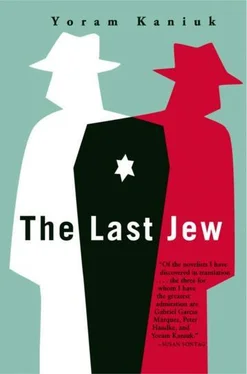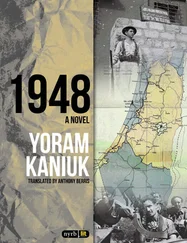Joseph took the body of the old man wrapped in rags down to the courtyard, put it in a wheelbarrow, and took the corpse to the river. The municipal clerks came and asked him to help burn the cats because the plague was spreading to all parts of the city and the cats, they said, ate the mice the Jews burned in their houses to ward off the epidemic. After the cats were burned, he went down to the cellar and read the writings his father had left, read the "Words of the Days of the Lord" and felt vague but not intangible yearnings for the messiah Frank. He thought about the venom infiltrating his blood, about his mother, about the sorrow of his beauty, about his life, about his father, and thus he found out about Secret Charity and Rebecca Secret Charity. He went to the cemetery and searched for the tombstones. He found the graves of Rebecca and her father close together. He sat for hours and looked at the tombstone on the grave of Rebecca Secret Charity. He heard a tune coming from the grave and without moving he followed the tune and without moving his body he encountered daydreams that led him to realms where he had never been and on the tombstone, Rebecca's face began to be marked. At first the picture of her face was rough but it became clear. He burned a few branches in a pit, turned them into charcoal, and went over Rebecca's features with the charcoal, she looked a lot like him and didn't look like him at all. A painter of amulets came and copied Rebecca's face on paper and then went to his workshop and made Joseph an amulet of the face of Rebecca Secret Charity. And then came a letter from Russia with a curl of his father's hair. His father's will was addressed to his mother. Joseph wasn't mentioned in it. The letter said that Joseph's father plotted against some aged colonel and was sentenced to death. Not to be accused of devotion to a despicable religion, he hadn't said the Shema Israel and refused to accept forgiveness from a priest. When he was hanged, a writer wrote in the letter, he muttered words in Hebrew. He died as a revolutionary, said the letter, even though he was a troublemaking Jew all his life. Joseph went to the rabbi of the city and asked permission to be a Jew again. The rabbi blessed him and Joseph said: In fact, never was I anything, not a Christian, not a Jew, but the rabbi questioned him and received him back in the bosom of Judaism. Joseph's mother went on embroidering new royal gowns for herself that were just as beautiful and splendid as the arrogant words of her son. Joseph was sometimes her son, sometimes her husband, and sometimes an old adulterer who came to have sex with her. She tried to return to the Land of Israel and in her madness she began to recall her childhood there more vividly. She described Bethlehem, Jerusalem, and the Dead Sea to Joseph, and only years later, when he toured the Land of Israel, did he see how precise her description was and how correct were the details she painted and had never seen, and then she began to die and Joseph lay her in bed dressed in a royal gown, brought her hot tea and cookies, lay down next to her a whole night and hugged his trembling, weeping mother, who wanted to return to her homeland, and when she died, there was on her face a smile of bliss that Joseph had never seen there before. And then he wept. For the first time in his life, the handsome lad wept. He found a picture of his father, hung it on the wall, found a whip his father had kept in the cellar against the enemy who would come in the war between Gog and Magog and flogged his father's face until the picture was shredded. Joseph put on a splendid suit, shiny black boots, the black broad-brimmed hat of a Spanish grandee, picked up a short stick, and after arranging his mother's grave, he set out on the road.
In the women he found in his wandering, he sought the image of Rebecca that he wore as an amulet around his neck, but the only thing the women wanted from him was to be impregnated in his honor. When somebody in a tavern in Paris quoted a German philosopher who said that in vengeance and in love, women are more barbarous than men, Joseph said, and in life in general, and thought about the bold and roguish beauty of his great-grandmother.
Tape / -
In those ten years of wandering, Joseph Rayna begat fifty-two sons and daughters. Women saw him (as one woman put it in a letter preserved in the Nazi archive, titled: "Female claims concerning the imaginary virility of individual Hebrews who abused the innocence of Aryan women and bred with them with impure blood (A) Hebrew gestation, (B) contrition of Aryan women, (C) example of Francesca Glauson who delivered her son to the Gestapo in Bonn in 1942 and after the boy died, in an incident that took place in a camp, she described in detail the cunning of Hebrew wooing and taught a class of girls in Haan and later in Hamburg how to escape those and other errors, Heidelberg, 1944") as a harsh and deformed angel noble as beggars can sometimes appear: delicate and sensual. Women, says the letter of that woman, Frau Helma Rauchsfinger, loved the arrogant indulgence of Joseph Rayna, his self-confidence demonstrated in a generous and light manner. By submitting to that man-like other Hebrews-they thought they were fighting sins that wanted so much to be committed and overcoming themselves to be worthy afterward for somebody who would compensate them for all the suffering mixed with tormented joy, a person who would grant them bliss and safety and would wipe away the disgrace they had to experience in their flesh to know it up close. There's nothing like carnal experience to grant a woman what a man can get from abstract thought, maybe, writes Frau Helma Rauchsfinger, a woman can't even think an abstract thought, only abstract hating and loving are allowed both men and women.
When I read that material years later I laughed also because all my lovers were sons of Joseph and also because all my life I had been searching for Joseph and didn't find him and even though I thought he was my father, I was the only person of all the descendents of Joseph who couldn't really have been his son.
Joseph remembered all his offspring and all his women. He loved them no more than they loved him, but he understood their lust for him, just as the flower surely understands that not every butterfly is in love with it, but needs its smell and its pollen.
Joseph treated his women with a chivalry that many people in the late nineteenth century said had disappeared from the world. After wandering in many countries, he came to Denmark. In a fishing village in northern Jutland, where the Baltic Sea and the Atlantic Ocean meet, at different water levels, in a restrained dreary and bewitched light, the most enchanted light he had ever seen, he met a good-looking painter, fair and sickly, she sat in the strong cold, wrapped in a yellow wool shawl that glowed in the distance and painted purple waves where a scarlet hue poured a sense of ancient death and a boat, abandoned by gray-faced sailors who would never return, was bobbing on them. In the enchanted light, the painter looked like a goddess carved from rock. And she said: In that boat sits my brother, who disappears every winter and someday will return. Later on, she told Joseph that her mother brought soil from the Holy Land and her father was buried there, I think, she said, that he was a wandering Jew who came upon Jutland as a youth, and lived his whole life as a Dane but before he died he recalled his origin and asked his family to bury him on the Mount of Olives. She expressed no opinion on the subject and didn't care if her father was a Jew or not. She was a painter and painted the strong light.
As the winter intensified, they wandered to the Netherlands, went to Paris, from there to Italy, sailed to Alexandria and from there to the Land of Israel. Those were good times in Joseph's life. He listened to the painter's story about the paintings she was to paint, loved her exciting asceticism, her lack of lust for him, and her sharp and unique love.
Читать дальше












